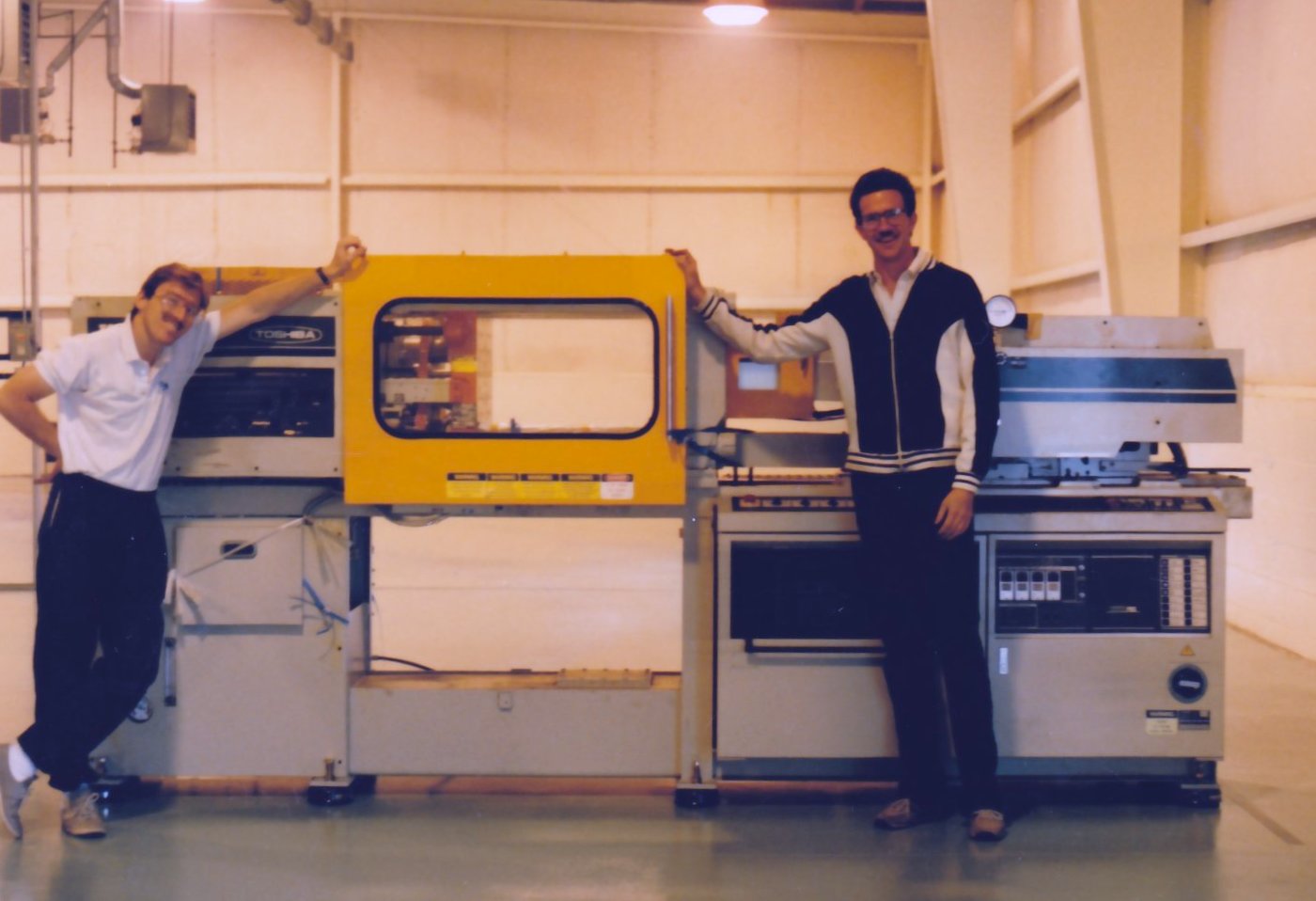A Look Back at the History of Team 1 Plastics
As part of the year-long celebration of its 30th anniversary, Team 1 Plastics, a plastic injection molding company for the transportation industry, is highlighting different milestones in its history through a series of articles. This month’s article features how the Cold War affected Team 1 Plastics’ purchasing decisions of injection molding presses.
In 1987, the three original owners of Team 1 Plastics, Craig Carrel, Gary Grigowski, and Jim Capo, were formulating their plans to open the company. A major decision that needed to be made was what injection molding presses would be purchased. The dependability and quality of those machines had the potential to make or break the company, and dollars were limited. The three men devoted much time and research in determining what brand and size of presses to obtain.
The men decided to purchase two 90-metric ton presses from the Toshiba Machine Company. According to Craig Carrel, President of Team 1 Plastics, “We researched our first machine purchase and decided on Toshiba because Jim Capo knew that many of our potential Japanese customers used Toshiba machines and would be very comfortable with Team 1 using them. Presses built by Toshiba had excellent reputations of quality, and we would be able to finance the purchase through their leasing company.
“We ordered two identical 90-metric ton Toshiba molding machines, thinking that we wanted a direct backup. In case one machine had problems, we could transfer the parts to the other identical machine,” Carrel said. “We knew that our potential Japanese customers would have small parts to transfer, and our plastics experience with Celanese resins, nylons, acetals and polyesters fit this tonnage size.”
The decision was made, and the order was placed. Then, came the first wrinkle. Toshiba did not have two 90-metric ton presses in stock – it only had one.
“If we really wanted two 90-ton machines,” Carrel said, “we would have to wait for the second press to arrive from Japan. That would delay our planned start-up date for the company.”
Toshiba did, however, have a 120-metric ton press in stock. “We decided that we would purchase the 90- and 120-metric ton machines. That turned out to be a very fortuitous decision because our very first job from Regal Plastics would only fit in a 120-ton machine. We would not have been able to run it if we had only 90-ton machines.”
Soon after Team 1 owners had decided to purchase presses from Toshiba Machine Company, disturbing news reports were published about Toshiba. It had been discovered that, beginning in 1981, Toshiba Machine and Kongsberg Vaapenfabrik had sold sensitive technology to the Soviets in violation of the regulations of the Coordinating Committee for Multilateral Export Controls (COCOM).
According to the New York Times article, Submarined by Japan and Norway, “Under false pretenses, the companies shipped machinery to the Soviet Union that will enable the Russians to fabricate quieter submarine propellers. Soviet submarines will now become much harder to detect.”
“Defense experts said the sale, which went unnoticed for months, has seriously jeopardized the security of American naval forces,” according to the Chicago Tribune article, Senate Still Bristling Over Toshiba Scandal. “American ships had been able to hear Soviet subs as far as 200 miles away, but now, officials say, the hearing range is about 20 miles. The milling equipment sold to the Soviets enabled them to make quieter submarine propellers. `With this sale, we find ourselves with a nation arrayed against us with submarines which are not only faster . . . but as quiet,` Sen. Malcolm Wallop (R., Wyo.) said.”
In 1988, the U.S. government punished Toshiba by banning sales of their products in the United States for three years. Wrinkle number two – just as Team 1 Plastics was getting started and beginning to grow, its chosen supplier of injection molding presses was banned from selling in the United States.
Carrel recalled Team 1’s reaction to the news. “When we purchased our two initial presses, nothing had come out yet about Toshiba selling technical equipment to the Russians. When the news finally broke and Congress banned them from selling in the U.S., it was devastating news. We were starting to grow and were very happy with the Toshiba machines.”
He continued, “We had to shift gears quickly. After further research, we decided to purchase Nissei molding machines – for many of the same reasons as we had originally selected Toshiba. As we began working with Nissei, we found them to be comparable to the Toshiba machines, and they met our needs as we expanded.”
Over the years, the company has added other brands of injection molding machines. The company wanted at least two different brands in the plant. Because Toshiba wasn’t an option, the company purchased a few Mitsubishi injection molding presses. Then, Carrel said, Sumitomo offered the company “great pricing on a package of machines, and we purchased several machines.” He added that “at one point in our history, we had four different brands – Toshiba, Mitsubishi, Nissei and Sumitomo – in the plant at the same time. We discovered that having so many different machines added complexity, along with more spare part inventory.”
More recently, Team 1 Plastics has purchased Sodick injection molding presses. “We discovered Sodick based upon their reputation with lens and light pipes. Their screw/plunger design minimizes black specs and has become a workhorse for our lens and light pipe parts. In addition, we have experienced reduced maintenance costs related, in particular, to screw and barrel replacements,” Carrel said.
Going forward, Team 1 Plastics expects its future purchases of injection molding presses to be mostly focused on the Sumitomo and Sodick brands. But then, thirty years ago, the company had expected to purchase more Toshiba presses – that was, until the Cold War got in the way.








Danielle Sheldon says:
Jeffery Carrel says:
Jeffery Carrel says: